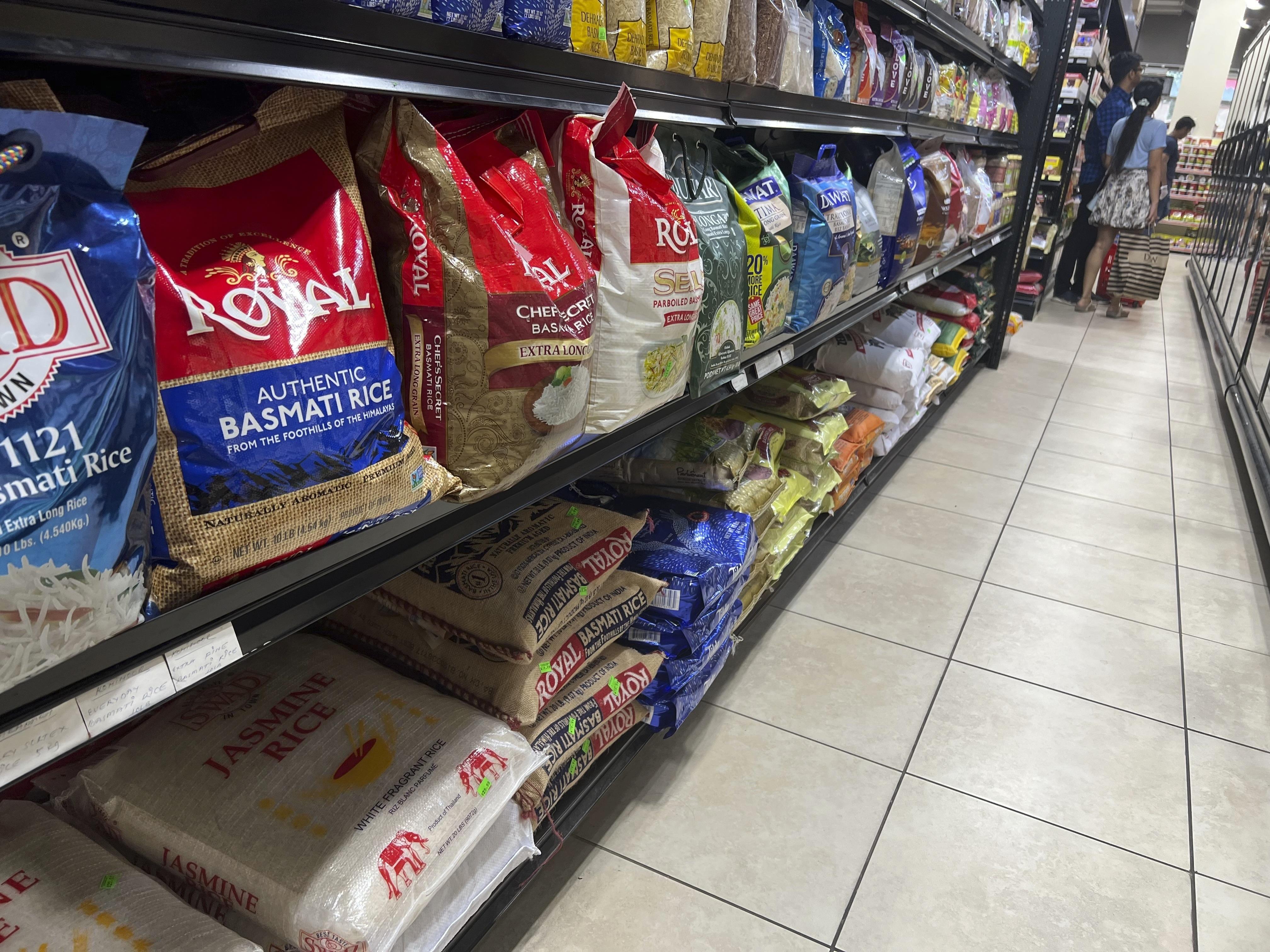 Rice is on display at Little India, an Indian grocery store in New York on July 29, 2023. (PHOTO / AP)
Rice is on display at Little India, an Indian grocery store in New York on July 29, 2023. (PHOTO / AP)
As the world’s leading rice exporter, India’s ban on non-basmati white rice will significantly reduce Indian rice exports in the near term and cast an impact on the rice-importing countries around the world, experts said.
They added that global food security may be affected as the prices of rice and other agricultural products have already gone up.
The partial ban was announced earlier by the Indian government amid concerns about rapidly rising domestic rice prices in the country this year, at a time when some other food prices are also rising rapidly, said Rajiv Biswas, Asia-Pacific Chief Economist, S&P Global Market Intelligence.
READ MORE: India rice export ban puts market on edge for copycat curbs
“A key uncertainty for the Indian government is the potential risk from a severe global El Nino weather event later this year and during 2024 that could reduce Indian harvests of key food crops such as rice and wheat,” he added.
While rich nations with high per capita income levels will be able to afford to import higher price rice as well as other substitute cereals, low-income rice importing nations in Africa face greater vulnerability to disruption of rice imports as well as significantly higher rice prices
The Indian government on July 20 banned the export of non-basmati white rice, which accounted for about 25 percent of India’s rice exports, to boost domestic supply and keep retail prices under check.
With rice exports accounting for about more than 40 percent of the world’s total, India’s partial rice export ban has already contributed to rising world rice prices. In 2022, India exported a record 22.2 million tonnes. According to a report by the Food and Agriculture Organization in early August, the United Nations’ food agency, world rice prices soared to their highest level in almost 12 years, which means being up by around 20 percent year-on-year.
READ MORE: Thailand says no rice export halt, to benefit from India's export ban
The International Monetary Fund (IMF) has encouraged India to remove restrictions on the export of a certain category of rice, saying it would have an impact on global inflation.
The ban had elicited mixed responses. Some said the decision was “premature” and can be removed.
“This is a knee-jerk reaction, especially given the fact that as of July 1, the government’s stocks of rice were three times the buffer stock norm,” said agricultural economist Ashok Gulati.
Such restrictions are likely to exacerbate volatility in food prices in the rest of the world and lead to retaliatory measures, which can be harmful globally, Pierre-Olivier Gourinchas, IMF's chief economist and director of the research department, told a press conference after the release of the World Economic Outlook in late July.
ALSO READ: IMF urges India to lift rice export ban amid inflation concerns
“The ban can never be an answer to inflation,” Gulati, who is also a former chairman of the Commission for Agricultural Costs and Prices (CACP), told China Daily. The CACP advises the Indian government on food supplies and pricing policies.
Economist Abhirup Sarkar, who teaches at the Statistical Institute of India, however, staunchly backed the ban. “Whatever may be the consequences, I back the government for its India-first approach,” he told China Daily.
“No sentimentality should be attached to it. Primarily, a government needs to serve its own people,” Sarkar added.
An Indian ministry, meanwhile, argued that the domestic prices of rice were on an increasing trend. The retail prices had increased by 11.5 percent over a year and 3 percent over the past months.
READ MORE: GCC food security renews focus after UAE's rice export ban
The prohibition on export of non-basmati white rice will lead to a lowering of prices for consumers in the country, the Indian ministry of consumer affairs, food & public distribution said in a statement.
However, India’s partial rice export ban is not the only factor that is impacting global food security and food prices in the near term. Other factors that could reduce world food exports include the disruption of Ukrainian grain exports due to the Russia-Ukraine conflict as well as the looming risk of El Nino, said economist Biswas.
There are other major rice-exporting countries, including Thailand, Vietnam, the United States and Pakistan. But it is expected to be difficult for other rice exporting nations to completely fill the gap left by India’s export ban, which would reduce India’s annual rice exports by around 10 million tons.
ALSO READ: 'Rice kingdom' farmers fear crops may be lost
While rich nations with high per capita income levels will be able to afford to import higher price rice as well as other substitute cereals, low-income rice importing nations in Africa face greater vulnerability to disruption of rice imports as well as significantly higher rice prices.
According to Gulati, the “abrupt ban” would hurt poorer nations. “If India has to emerge as a responsible leader of the Global South in G20, such sudden bans need to be avoided,” he wrote in the Times of India newspaper along with co-author Raya Das.
Prime Sarmiento contributed to the story.


